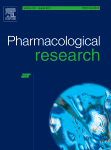ESCULETIN PREVENTS LIVER DAMAGE INDUCED BY PARACETAMOL AND CCL4
Abstract
Esculetin, a phenolic compound found inCichorium intybusandBougainvllra spectabilliswas investigated for its possible protective effect against paracetamol and CCl4-induced hepatic damage. Paracetamol produced 100% mortality at the dose of 1 g kg−1in mice while pre-treatment of animals with esculetin (6 mg kg−1) reduced the death rate to 40%. Oral administration of paracetamol (640 mg kg−1) produced liver damage in rats as manifested by the rise in serum enzyme levels of alkaline phosphatase (ALP) and aminotransferases (AST and ALT). Pre-treatment of rats with esculetin (6 mg kg−1) prevented the paracetamol-induced rise in serum enzymes. The hepatotoxic dose of CCl4(1.5 ml kg−1; orally) also raised serum ALP, AST and ALT levels. The same dose of esculetin (6 mg kg−1) was able to prevent the CCl4-induced rise in serum enzymes. Esculetin also prevented CCl4-induced prolongation in pentobarbital sleeping time confirming hepatoprotectivity. These results indicate that esculetin possesses anti-hepatotoxic activity and the presence of this compound inCichorium intybusandBougainvllra spectabillismay explain the folkloric use of these plants in liver damage.

